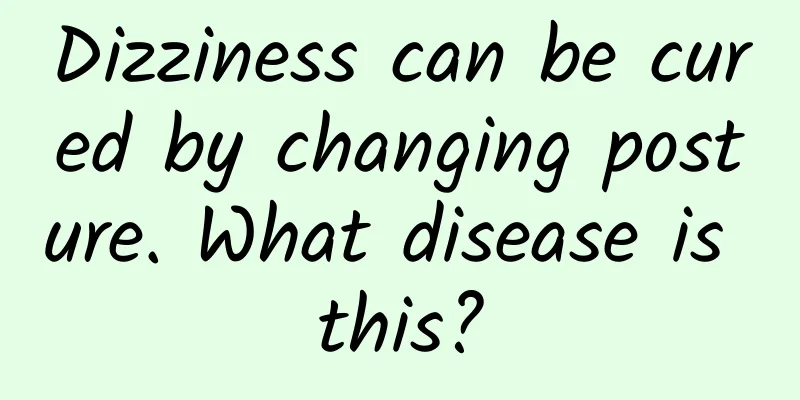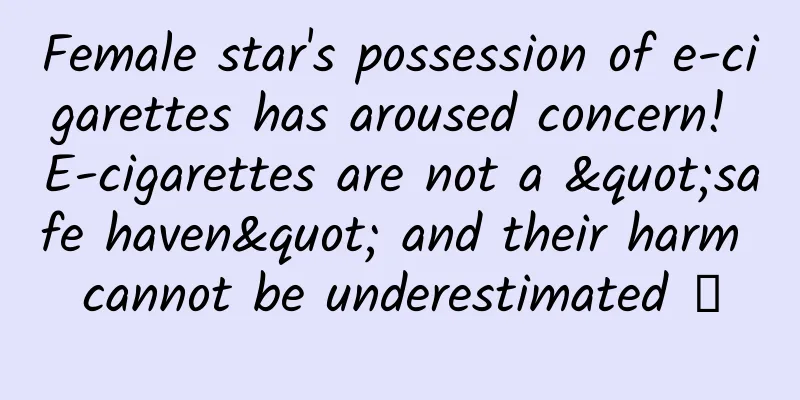Dizziness can be cured by changing posture. What disease is this?

|
Author: Tang Qin, Researcher of Chinese Medical Association Reviewer: Liu Huizhen, deputy chief physician of China Rehabilitation Research Center Vertigo refers to the feeling of self-movement of the head or torso without any self-movement, or a distorted sense of self-movement during normal head movement. The typical feeling is dizziness, and sometimes it is also manifested as a shaking, tilting, up and down, jumping or sliding sensation. It can be divided into ear-related vertigo and non-ear-related vertigo according to the location and cause of occurrence. Dizziness caused by posture is generally ear-related vertigo. Figure 1 Copyright image, no permission to reprint 1. Pathogenic factors of otopathic vertigo Otogenic vertigo refers to vertigo caused by lesions in the inner ear labyrinth or vestibule, with paroxysmal vertigo as the main feature. During an attack, the patient's vertigo may be aggravated by moving his hands and feet, turning his head, or opening his eyes. It is usually caused by some ear diseases or non-disease factors, including the following. 1. Disease factors Benign paroxysmal positional vertigo : also known as otolithiasis, has a very high incidence rate, even as "common" as a cold. Everyone may experience vertigo caused by otolithiasis in their lifetime, but the severity varies. It is characterized by sudden but short-lived severe vertigo when turning the head left and right in bed or getting up in the morning, that is, after a change of body position. This disease is a benign process, generally relieved in 1 to 2 weeks, and can be caused by factors such as aging, trauma, anger, alcoholism, fatigue, insomnia and surgery. Meniere's disease : also known as "Meniere's syndrome", is characterized by repeated attacks of vertigo, accompanied by hearing loss, tinnitus and other symptoms. It is an inner ear disease characterized by unexplained hydrops in the labyrinth. This disease occurs widely around the world and is still incurable, but it is possible to improve symptoms by changing lifestyle habits and taking medication. Vestibular neuritis : It may be related to viral infection or vestibular blood supply disorder. It is a sudden onset of vertigo. When the symptoms are severe, the patient may collapse suddenly. Otitis media : Since the middle ear cavity and the inner ear are closely adjacent, once inflammation affects the inner ear, inner ear symptoms such as dizziness, tinnitus or deafness will appear. Labyrinthine hydrops : This is the final pathological state of inner ear diseases caused by various causes. It begins with hearing loss in one or both ears, and then otogenic vertigo occurs after 1 to several years. 2. Non-disease factors Head injuries (including injuries to the neck, central nervous system, and vestibular periphery) can cause otogenic vertigo. In addition, emotional excitement or fatigue can also cause otogenic vertigo. Figure 2 Copyright image, no permission to reprint Clinical manifestations and diagnosis The occurrence and intensity of ototoxic vertigo are often related to changes in the position of the head and body. Its clinical manifestations mainly include the following. 1. Severe rotational vertigo : Generally, the vertigo symptoms caused by benign paroxysmal positional vertigo will last from a few seconds to 1 minute, the vertigo symptoms caused by Meniere's disease will last from a few minutes to a few hours, and the vertigo symptoms caused by vestibular neuritis will last from a few days to a few weeks. Changes in head or body position can significantly aggravate the vertigo symptoms. 2. Balance disorder : Most of the time, patients will feel dizzy or swaying left and right, up and down, making it easy for them to stand or walk unsteadily, or even fall. 3. Nystagmus : When patients have vertigo, their eyes often tremble, and they are mostly horizontal or horizontal and rotational, rather than vertical, and the amplitude usually changes. Nystagmus will subside or disappear after a few hours or days. 4. Other associated symptoms : Patients usually have some other associated symptoms, such as tinnitus, hearing impairment, etc., and sometimes accompanied by autonomic nervous system symptoms such as nausea. Clinically, the diagnosis of otopathic vertigo is mainly confirmed through auxiliary examinations. 1. Vestibular function examination : including balance function examination and nystagmus examination. By examining the vestibular function, it can be determined whether the vestibular function of one or both sides is weakened, lost or hyperactive. 2. Examination of hearing function : Some vertigo may be accompanied by hearing loss, such as Meniere's disease. Pure tone audiometry, acoustic impedance testing, and electrical response audiometry can be used to determine whether hearing loss exists. 3. Imaging examination : including ear computed tomography and magnetic resonance imaging to determine whether there are space-occupying lesions in the middle ear and inner ear. Figure 3 Copyright image, no permission to reprint 3. Etiological treatment and symptomatic treatment The treatment of otogenic vertigo is divided into etiological treatment and symptomatic treatment. 1. Etiological treatment : Etiological treatment is the basis of the treatment of otopathic vertigo. The prognosis and treatment effect should be preliminarily judged based on the cause and the condition of vestibular function damage, which can be summarized into the following 3 situations. The original cause is easy to treat: the vestibular function is still reversibly damaged . In this case, the patient has a good prognosis, such as benign paroxysmal positional vertigo. Since the vertigo symptoms are caused by irritation or reflex, there is no irreversible damage to the vestibular center and extremities. When the cause is eliminated, the vertigo symptoms will disappear and the vestibular function will recover. The original cause of the disease is clearly diagnosed: vertigo caused by irreversible vestibular function damage . For example, labyrinthitis and vestibular neuritis caused by labyrinthine hydrops, because the labyrinth or vestibular nerve function is completely destroyed, the vestibular function cannot be restored even if the cause is eliminated, and the vestibular center needs to compensate to eliminate the vertigo. The original cause is difficult to treat: the vestibular function is fluctuating or irreversible . For example, Meniere's disease is currently incurable, and the vertigo symptoms will recur from time to time. In this case, if conservative treatment is ineffective, surgical treatment should be considered. 2. Symptomatic treatment Non-surgical treatment for vertigo attacks : The patient should lie or sit in a comfortable position, rest more, avoid eating spicy and irritating foods, quit smoking and drinking, eat less salt, and avoid sound and light stimulation. When vertigo attacks acutely and autonomic nervous system symptoms are obvious, atropine can be used to relieve severe nausea and vomiting on the basis of excluding serious circulatory system diseases. In addition, sedatives, diuretics and dehydration drugs that inhibit the vestibular nerve can also be used to relieve symptoms. Surgical treatment : When Meniere's disease causes severe vertigo symptoms, the duration of the attack exceeds 3 months, or the frequent attacks seriously affect work and life, or the vertigo symptoms are not stubborn but accompanied by progressive hearing loss and hearing loss of at least 30 decibels, the language discrimination rate is less than 50%, and conservative treatment such as medication is ineffective for more than 1 year, surgical treatment can be used. The principle is to eliminate vertigo symptoms, maintain hearing and minimize the occurrence of complications. The most popular surgical procedure in clinical practice is semicircular canal fenestration and cryosurgery, which has good efficacy and no obvious complications. In fact, maintaining a good attitude and a happy mood can effectively prevent vertigo attacks and reduce their frequency. Therefore, in addition to taking active treatment measures, patients with otogenic vertigo should also pay attention to mental conditioning. Whether in daily life or at work, do not put too much pressure on yourself. Exercise more and participate in more activities that are beneficial to your physical and mental health to distract your attention. References 【1】Fang Ming, Hu Min. Practical Emergency Manual[M]. Beijing: Chemical Industry Press, 2019. 【2】Wang Zhongqing, Wang Hannan. Unraveling the mystery of vertigo[M]. Harbin: Heilongjiang Science and Technology Press, 2020. 【3】Ma Jun, Xu Zhongqing. Practical Handbook for General Practitioners[M]. Beijing: People's Medical Publishing House, 2020. |
<<: Aspartame is classified as a Class II carcinogen. Is it really dangerous?
Recommend
How many days does acute vulvitis take to heal?
Speaking of subacute vulvitis, I believe everyone...
How to supplement food for less menstrual flow
For women, if their menstrual flow is too little,...
What is the best way to maintain ovaries?
Once women reach menopause, they will find that t...
Symptoms and pictures of vulvar rash
Female vulvar eczema is a relatively common aller...
Can I eat bananas during my period?
Speaking of bananas, many people love them very m...
What is the best way to increase milk supply during confinement?
For new mothers, the most feared thing is insuffi...
Can girls cut their pubic hair?
Every one of us ladies has pubic hair, but many l...
Why do girls have black nipples?
Dark nipples in girls are a very common condition...
What to do if you have withdrawal bleeding after taking birth control pills
Most women nowadays do not take good care of thei...
Delayed menstruation, increased leucorrhea, back pain
I believe that most women are familiar with the p...
The color of a woman's hair can indicate kidney disease
We often see young people dyeing their hair in va...
A woman will regret this change in appearance for the rest of her life
Breasts are a symbol of femininity, but many bad ...
How to take care of episiotomy quickly
The episiotomy wound during normal delivery must ...









